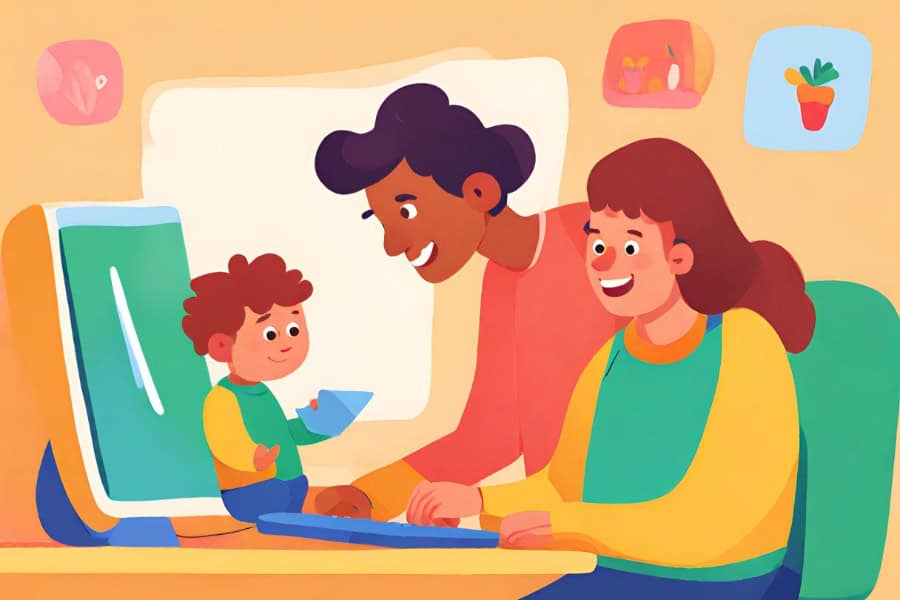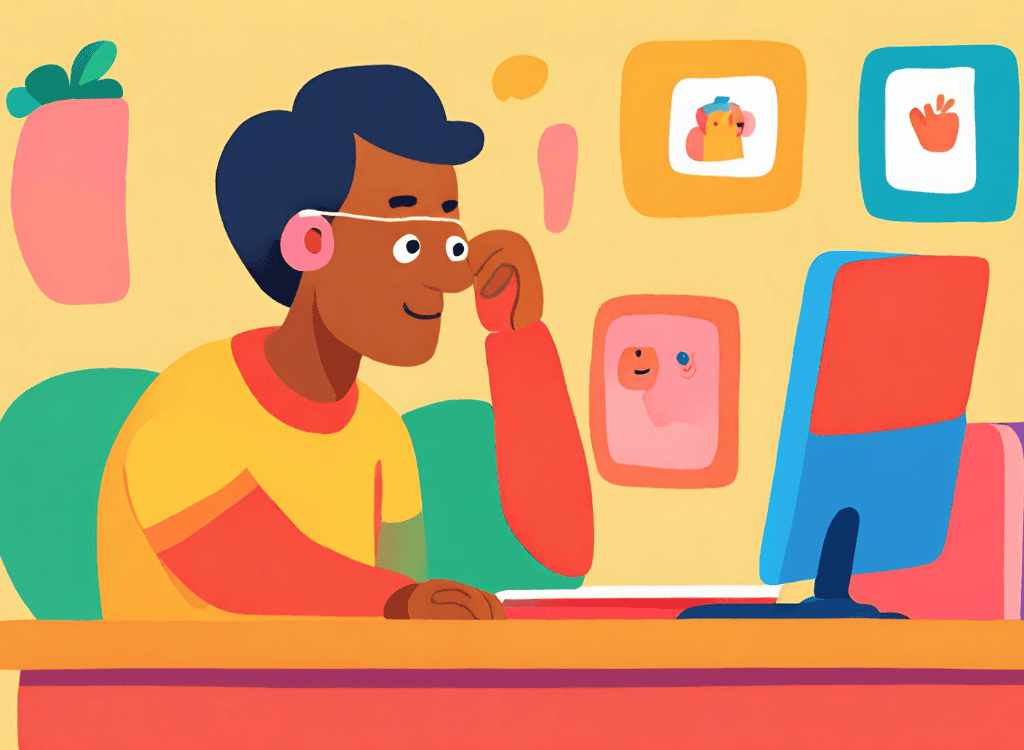What Is The Meaning Of Digital Parenting?

Average Reading Time: 8 Min
Quick Summary
- Advancements in the world of technology greatly influence our approach to parenting. Keeping children away from the digital world is almost impossible nowadays, and it’s not necessarily the healthiest approach either.
- As children adapt to the internet and technology, parents have varied strategies. Some prefer to entirely restrict the time and content, while others opt for finding a balance.
- The concept of digital parenting aims to integrate children safely into technology without alienating them from the positive aspects of the online world
Digital parenting has become a widely discussed concept worldwide, especially with the advancement of technology. This is because as our lives become intertwined with technology, the necessities of parenting are evolving. Children are born into a world shaped by technology and modern norms. Therefore, it’s not possible to keep them entirely away from this world. As children become familiar with the world of technology and the internet, monitoring them appropriately and anticipating risks become part of a parent’s responsibilities. This knowledge and skill set that can guide children to use the digital world productively is encompassed under “digital parenting”. We can briefly answer the question “What is digital parenting?” in this manner. Let’s take a closer look at this concept for a detailed understanding.
We recommend you click here to get acquainted with Nutcracker, one of the greatest allies for digital parents, and keep our website open in a new tab. After reading our article, you can easily realise the importance of Nutcracker’s features and see how it supports you in keeping your child safe online, even when you’re not by their side! 🙂
What you need to know about the concept of digital parenting
Digital parenting has become a frequently discussed concept worldwide, particularly with the advancement of technology. As our lives become increasingly intertwined with technology, the requirements of parenting are also evolving. Children are born into a modern world shaped by technology. Therefore, it’s impossible to completely shield them from this online environment. As children become acquainted with the world of technology and the internet, it becomes one of the parents’ responsibilities to monitor them appropriately and anticipate risks. The skills and knowledge to guide children in using the internet and technology effectively fall under “digital parenting”. In short, this answers the question, “What is digital parenting?”. To understand the meaning of digital parenting in more detail, let’s delve into the concept.

What is the definition of digital parenting?
The definition of digital parenting entails the process of informing, guiding, and protecting children and teenagers against potential risks they may encounter in the online world. It means parents understanding how their children use social media, the internet, gaming consoles, mobile apps, and other technologic products, and not only understanding but also guiding them.
At this juncture, the distinction between understanding and guiding is crucial. Digital parents not only understand their children’s online habits but also take necessary steps to protect them from online risks. They maintain open communication with their children and encourage them to use technological tools consciously, fostering them to become responsible digital citizens of the future. This concept underscores the importance of parents guiding their children on how to be more empathetic, conscious, and responsible individuals in the online realm.
Why can parenting your child in the digital world be challenging?
The online world allows users to be anonymous, share whatever content they want, and reach wide audiences. This modern setting brings with it various risks that parents need to be wary of. For detailed information on these risks, you can read our article, “The Top 5 Internet Safety Risks for Children and How Parents Can Mitigate Them”.
The challenge of being a digital parent stems from the ability of these risks to reach your child through numerous channels. The popularity of social media platforms can impact children’s social skills, self-esteem, and self-perception, while also increasing the risk of encountering negative situations like cyberbullying. Moreover, the digital realm can make children more vulnerable to online threats.
At Nutcracker, we provide everything you need to establish conscious internet usage habits, ensuring online safety for your child even when you’re not with them, by controlling both screen time and content.

Why is digital parenting so important?
Today, technology and the internet have become indispensable parts of daily life. The importance of digital parenting emerges precisely in this context. Criticising the internet or technology and completely isolating children from it is not only unrealistic today but also deprives children of educational and entertaining opportunities in this environment. The best thing to do is to ensure that children use their screen time adequately and through the right channels. The best way to achieve this is by having parents who are familiar with the online world, recognize its facets, and prevent potential risks appropriately.

What are the styles of digital parenting?
Based on their perspectives and approaches to the online world, we can categorise digital parenting styles into three main groups:
Digital facilitators
These parents don’t set any restrictions regarding their children’s internet use. Parents with a facilitator style allow their children to determine their internet usage time. Generally, everyone in the house has their own screen, and children spend time as they wish with their devices. These parents are relaxed and allow their children to explore the internet/technology in their own way. Facilitators are typically parents of teenagers and are more relaxed compared to the other two styles.
Digital restrictors
Unlike facilitators, restrictors see the internet and technology as fraught with risks. While this concern is somewhat justified, these parents usually attempt to resolve it by minimising screen time. They typically introduce their children to technology at a later age, fearing the potential physical and mental effects. They aim to protect their children.
Digital mentors
You can think of mentors as guides showing the way to their children. They strike a balance between the facilitators and restrictors and tend to have a more moderate approach. Mentor parents are aware of online safety risks. They know about social media platforms, current games, and their potential impacts. They also understand how and how much time their children spend online. They assess both the risks and benefits, maintaining open communication with their children. They particularly educate their children about cyber safety, online strangers, and excessive screen time. In some cases, especially when the child is young and cannot discern risks, they employ parental controls to manage internet usage most healthily. Rather than avoiding technology, they create opportunities to spend time with their children in the online world, aiming to establish strong communication and keep them safe.

What do digital Safety, digital well-being, and parental control mean?
After understanding the styles of digital parenting and its concept, three crucial terms emerge that today’s conscious parents must know:
Digital safety
Online safety encompasses not just technical measures but also online habits and behaviours. Proper internet usage knowledge, creating strong passwords, regular software updates, and avoiding suspicious links can significantly reduce potential threats. Especially for children and adolescents, online safety education is crucial for awareness of the risks of the digital world and how to handle them.
Digital health
This refers to preserving physical, mental, and social health while using tech devices and platforms. It includes limiting screen time, preventing digital eye strain, balancing social media usage, and preventing digital addiction.
Parental controls
Throughout this article, we provided information on what parental controls are via Nutcracker. Revisiting the importance of parental controls, they can be described as your most significant ally on the path to becoming a digital parent.
Today’s technology brings with it risks that might concern you about your child, but it also offers creative solutions to protect them. Nutcracker effectively evaluates these solutions, presenting all the features you need in one place. And it’s not just for the online environment; it covers platforms such as Steam, PSN and Youtube.
Platforms like YouTube, TikTok, and Instagram Reels quickly attract attention with their entertaining content. On these platforms, very popular among young people, controlling the short videos consumed can be challenging. Unbeknownst to you, your child can watch these within minutes, and the apps might suggest similar content to them. Nutcracker analyzes the content and informs you whether is inappropriate or suitable. Thus keeping your child’s suggested video algorithm clean.
Another online safety concern is games. The games your child plays online might have harmful content in advertisements or might expose your child to potentially harmful social interactions. Nutcracker categorises game suitability according to your child’s age, allows you to block games that might contain inappropriate content like violence. This includes both web and console games.
To be a good digital parent, evaluating not only content exposure but also screen time and limiting it according to your child’s age is essential. Prolonged screen exposure can lead to orthopaedic issues and adversely affect eye health at a young age. Nutcracker organises the content your child consumes while also controlling screen time. It shows you how much time is spent on which app or device and keeps your child safe online, even when you’re not around.

